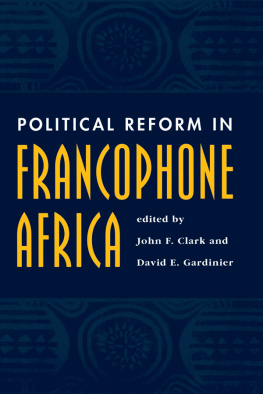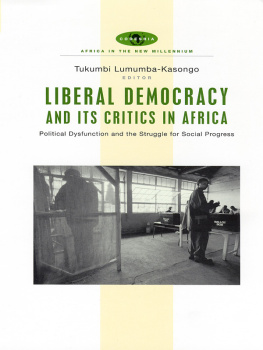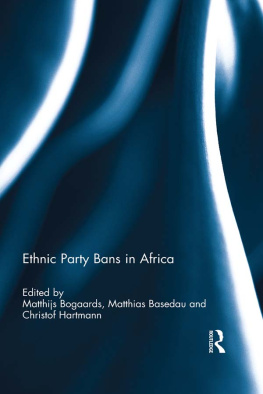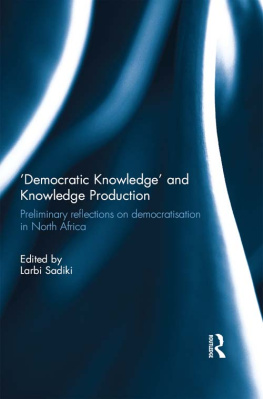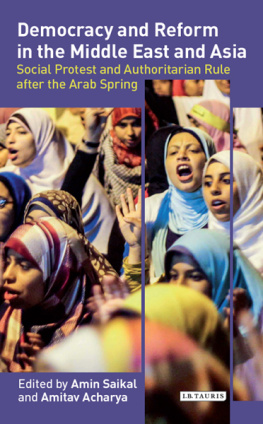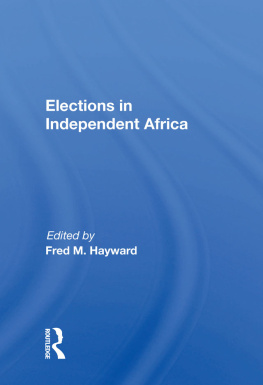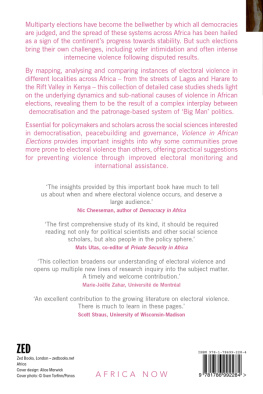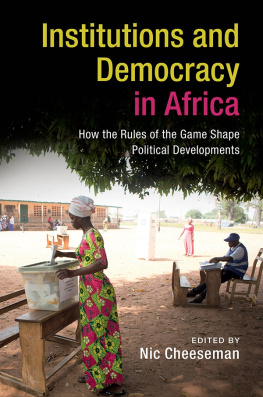Voting for Democracy
First published 1999 by Ashgate Publishing
Reissued 2018 by Routledge
2 Park Square, Milton Park, Abingdon, Oxon, OX14 4RN
52 Vanderbilt Avenue, New York, NY 10017
Routledge is an imprint of the Taylor & Francis Group, an informa business
Copyright John Daniel, Roger Southall and Morris Szeftel 1999
All rights reserved. No part of this book may be reprinted or reproduced or utilised in any form or by any electronic, mechanical, or other means, now known or hereafter invented, including photocopying and recording, or in any information storage or retrieval system, without permission in writing from the publishers.
Notice:
Product or corporate names may be trademarks or registered trademarks, and are used only for identification and explanation without intent to infringe.
Publishers Note
The publisher has gone to great lengths to ensure the quality of this reprint but points out that some imperfections in the original copies may be apparent.
Disclaimer
The publisher has made every effort to trace copyright holders and welcomes correspondence from those they have been unable to contact.
A Library of Congress record exists under LC control number: 98037431
ISBN 13: 978-1-138-37035-7 (hbk)
ISBN 13: 978-0-429-42803-6 (ebk)
Contents
Morris Szeftel
Roger Southall
John Daniel and Roger Southall
Lionel Cliffe and Donna Pankhurst
Carolyn Baylies and Morris Szeftel
Rok Ajulu
Roger Southall
Chudi Okoye
Diana Cammack
Roger Southall and Morris Szeftel
John Daniel and Roger Southall
Guide
Rok Ajulu is Senior Lecturer in International Politics in the Department of Political Studies, Rhodes University, Grahamstown.
Carolyn Baylies is Senior Lecturer in Sociology in the School of Social Policy and Sociology, and Director of the Centre for Development Studies, University of Leeds.
Diana Cammack has taught about and researched many aspects of politics in southern Africa, including Malawis elections and the aftermath of war and the plight of refugees in Mozambique.
Lionel Cliffe is Professor of Political Studies in the Department of Politics, University of Leeds.
John Daniel is Professor and Head of the Department of Political Science, University of Durban-Westville.
Chudi Okoye has worked as a journalist and as an academic researcher on the problems of democratic transition in Nigeria.
Donna Pankhurst is Senior Lecturer in the Department of Peace Studies, University of Bradford.
Roger Southall is Professor and Head of the Department of Political Studies, Rhodes University.
Morris Szeftel is Senior Lecturer in the Department of Politics, University of Leeds.
1
Political Crisis and Democratic Renewal in Africa
MORRIS SZEFTEL
The papers in this book examine the context and conduct of a series of watershed elections held in Anglophone Africa between 1989 and 1994. These elections crystallized a wider process of democratization, underway during the last decade, in which attempts were made to shift from various forms of authoritarian rule (colonial or racial oligarchies, military regimes, one-party states, or presidential rule) to pluralist parliamentary politics. Such attempts at democratic renewal were not confined to Africas former British colonies. Similar efforts were also made dining this period in Francophone Africa and in the war-ravaged states of Ethiopia, Eritrea, Uganda, Angola and Mozambique. Indeed, as Bayart has observed, from 1989 most sub-Saharan African countries experienced an unprecedented wave of demands for democracy, which succeeded in bringing about the downfall of several authoritarian regimes and forced others to accept multi-party politics (1993: x). The essays which follow bring together (for the first time) studies of these events in Anglophone countries of the continent, which share a comparable legacy of British colonialism, an acquaintance with the Westminister constitutional tradition, and even some related historical experiences of decolonization and democratic struggle.
The first in the cycle of elections, for a constituent assembly in Namibia in 1989, brought South Africas seventy year occupation of that country to an end and so created an independent state out of Africas last colony. The last, South Africas liberation election of 1994, allowed South Africans of all races to vote in a democratic election for the first time and formally ended three centuries of racial domination and African exclusion. In the years between these two events, a number of other Anglophone countries held elections, not to end colonial rule or settler domination, but to restore competitive, multi-party politics - in some instances twenty or more years after such systems had been abandoned. In the vast majority of these countries the pluralist constitutions established at the end of British colonial rule were progressively undermined by factional conflict and political instability and ultimately abrogated in favour of military rule or one-party regimes. Now, with the restoration of competitive elections and the re-establishment of the right to organize political parties, there was a return to this earlier legacy.
Precisely because they were linked to this wider process of democratization, and gave formal political expression to it, these elections constitute one of the most important political developments in the last quarter-century in Africa (Bratton and van de Walle, 1997: 3). Not all of them produced a successful transition to a democratic order, as the essays that follow demonstrate. Democratic elections and democratic reform proved neither inevitable nor unproblematic. Yet, if anything, in a continent devastated by international debt, war and violence, famine and disease, corruption and political instability, the attempt at reform was all the more significant where it occured and its achievements, however modest, the more noteworthy. Not surprisingly, therefore, it was initially universally welcomed by all but those whose control of office it threatened. Observers from most parts of the ideological spectrum hoped it might open up constitutional space for democratic forces and pressures for equitable development. Radical Africanists emphasised the opportunities that democratic struggles created for greater equality and social justice in Africa (The Review of African Political Economy , numbers 45/46, 1989 and 54, 1992; Gibbon, Bangura and Ofstad, 1992). Mainstream liberals explored the prospects for the development of multi-party systems and liberal institutions, the influence of external actors and the role of civil society (Healey and Robinson, 1992). And African scholars (encouraged by research organizations such as Codesria and OSSREA) focused particularly on questions of development, class, human rights and security (Anyang Nyongo, 1992; Imam, 1992). Democratization produced a new, if temporary, optimism and a justified pride in achievement among those on the continent who fought so hard for it.
The process was far from even and - by the end of the 1990s - generally incomplete. As the century moved to its end, many difficult struggles still lay ahead and many of the gains made proved temporary or modest in then-impact. Not all these elections successfully established democratic parliamentary systems. In Nigeria, the process was aborted while the votes were still being counted. In Lesotho, the settling of old scores, between the parties and between the military and the parties, undermined the transition. In Kenya, the elections were won by the old order and new democratic forces finished in disarray - as was to happen in subsequent elections five years later. Even where elections did change the government and where political systems based on ideas of freedom of association and electoral competition were successfully introduced, reform often became mired in the problems of economic underdevelopment. Moreover, the circumstances in which democratization occured, of economic and social crisis, and of state instability, remain capable of undermining every gain. Perhaps most worryingly, there was little evidence that the nature of African politics, rooted in clientelism and the manipulation of communal identities, had changed enough to sustain the momentum of democratization. Thus the prospects for democratization raised wider issues than could be resolved by any single election, however important. As Nelson Mandela put it, after the 1994 elections in South Africa: We have not taken the final step of our journey, but the first step on a longer and even more difficult road. (1994: 751).



